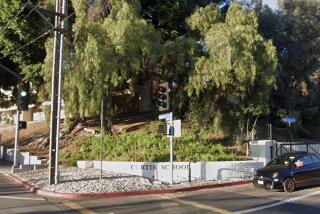UCI Internet Hate Mail Case Ruled a Mistrial
- Share via
SANTA ANA — The nation’s first prosecution of an alleged hate crime involving the Internet ended in a mistrial Friday, when a jury deadlocked 9 to 3 in favor of acquitting a former UC Irvine student who sent an e-mail message threatening to “hunt down and kill” Asian students at the university.
U. S. District Judge Alicemarie H. Stotler declared the mistrial after some jurors reported that they were hopelessly deadlocked after three days of deliberations.
The trial of Richard Machado, 20, of Los Angeles on 10 counts of civil rights violations had been seen as a test case for federal authorities seeking to police the Internet against hatemongers.
During the trial, the prosecution contended that Machado’s threats were not protected speech but civil rights violations.
By seeking to frighten the 59 mostly Asian students who received his e-mail threat, prosecutors argued, Machado had sought to interfere with their right to attend a public university in violation of federal civil rights laws.
But a majority of the jurors said they believed Machado was merely a disturbed teenager who didn’t really intend to harm the Asian students he targeted with his threatening message.
“We felt he was not innocent of sending the message but that he was not guilty,” said George Caldwell, the jury foreman. “He didn’t willfully set about to harm [the recipients]. We felt the government was merely making a test case out of this individual.”
Federal prosecutors have until Dec. 1 to decide if they will retry Machado.
But several jurors joined Machado’s defense attorney, Deputy Federal Public Defender Sylvia Torres-Guillen, in urging the government to drop the case.
Delrey Tuttle, a Westminster woman who voted to convict Machado, said she did not think “this is a case the government needs to go to the wall for.”
“It appears to me that this kid has serious problems,” Tuttle added. “I don’t know if it will do any good reprosecuting him.”
Torres-Guillen said: “Nine out of 12 jurors voting not guilty is a very strong message to the prosecution. Mere words are not a crime. [Machado] never had the intent to hunt down and kill anyone.”
*
During the trial, Torres-Guillen depicted her client as a young man who became distraught and flunked out of UC Irvine after his eldest brother was murdered in Los Angeles. She said he was despondent and bored, and was guilty of nothing more than “a stupid prank.”
Michael Gennaco, who heads the civil rights section of the U. S. attorney’s office in Los Angeles, said he and the prosecutor on the case, Assistant U. S. Atty. Mavis Lee, will consider jurors’ views in deciding whether to retry the case.
“We’ll have to see whether we can convince the next 12 people to vote guilty,” he added.
Gennaco said this jury’s vote would not deter the government from prosecuting similar threatening messages sent via the Internet.
“Clearly, we’ll prosecute these cases for deterrent effect,” Gennaco said. “The deterrent effect is already in place because we prosecuted this case.”
Machado was hit with 10 counts of civil rights violations for the e-mail he sent from UCI’s engineering building on Sept. 20, 1996.
The chilling message, signed “Asian Hater,” warned that all Asians should leave UC Irvine, otherwise the sender would “hunt all of you down and kill your stupid asses.”
“I personally will make it my [life’s work] to find and kill everyone of you personally. OK? That’s how determined I am. Do you hear me?”
Machado, who testified during the trial, said that on the day he sent the e-mail message he was bored and wanted to start a “dialogue” with people who were signed on to the school’s computer network.
He told jurors that his brother’s murder left him with an “inability to concentrate” on his studies, and this caused him to receive failing grades and end up getting expelled from UC Irvine in the summer of 1996.
*
Because he was ashamed to tell his immigrant mother about his expulsion, Machado concealed the truth from family members and continued to have one of his brothers drop him off at UCI even after he had been expelled. There he passed his days in the computer laboratory, sending and receiving e-mail and surfing the Internet, until it was time to go home.
He recalled telling campus investigators, who quickly traced the e-mail to him, that he simply wanted to “mess around” and “meant no harm” by the message. During the trial, jurors also heard testimony that Machado had apologized to leaders of the Asian Pacific Student Assn. at a meeting that he had asked campus administrators to organize.
His trial reignited debate about freedom of speech on the Internet, where context is often fleeting.
The defense called an expert in Internet etiquette who described Machado’s e-mail as “a classic flame”--online lingo for an angry message that, while annoying, is not meant to be harmful. The prosecution called its own expert, who said the message was not a flame but appeared to be a true threat.
Sharon Yagerlener, a juror who voted to convict, said she would have been terrified if she had received the message. Tuttle agreed.
“In light of our society today, that’s not something to take lightly,” Tuttle said.
But Roger Richmond said he voted not guilty because he believed the matter should have been handled by campus administrators--not the FBI and federal prosecutors.
“I think the government was simply trying to appease the Asian community. I didn’t see any need for that in this case.”
Machado is being held in federal custody pending a hearing before Stotler on Dec. 1.
Anna Machado, the defendant’s sister, said outside the courthouse Friday that she was happy that most jurors voted to acquit her brother.
“Justice has been done,” she said.
More to Read
Sign up for Essential California
The most important California stories and recommendations in your inbox every morning.
You may occasionally receive promotional content from the Los Angeles Times.













